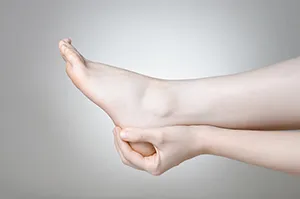What Causes Heel Pain in Avon, CT?

Also known as heel spur syndrome, the condition is often successfully treated with conservative measures, such as the use of anti-inflammatory medications, ice packs, stretching exercises, orthotic devices, and physical therapy. Note: Please consult your physician before taking any medications. In persistent cases, Extracorporeal Shock Wave Treatment (ESWT) may be used to treat the heel pain.
Are you dealing with heel pain? If so, plantar fasciitis or Achilles tendinitis might be to blame, as these are the two most common causes. While these conditions do sometimes go away on their own with the proper rest and at-home management, there are certain cases in which this condition may become chronic. If you are dealing with heel pain that hasn’t gone away after several weeks of at-home care, it’s time to turn to the foot specialists at Avon Podiatry Associates for answers. Dr. Richard Grayson uses CuraMedix Orthopulse Extracorporeal Pulse Activation Technology (EPAT) very successfully to treat plantar fasciitis and Achilles tendinitis/tendinopathy.
What is EPAT?
EPAT treatment, which stands for Extracorporeal Pulse Activation Technology, is also known as shockwave therapy. This advanced technology provides a non-invasive way to treat heel pain caused by plantar fasciitis or Achilles tendinitis.
Both plantar fasciitis and Achilles tendinitis cause microtears in the ligaments of the foot, leading to inflammation and heel pain. If you have plantar fasciitis, you may also experience pain and stiffness in the arches of your foot, as the plantar fascia also provide support for the arches. Fortunately, EPAT therapy can stimulate the body’s natural healing response while simultaneously increasing circulation and reducing your symptoms.
What is Treatment Like?
During EPAT treatment, a gel will be applied to the heel. Once it is applied, our podiatrist will guide a handheld device in circular movements over the area, where shock waves will be delivered to the inflamed and overworked tissues to stimulate healing.
What makes EPAT treatment so beneficial is that it is completely safe and non-invasive, with no known side effects or complications. It is completed right here in our office without the need for anesthesia. It may even be an alternative to surgery. The treatment itself only takes about 10-15 minutes and usually require about three sessions conducted over the course of several weeks for you to gain the full results.
Some patients experience relief from their symptoms after just one session, as they may be able to finally put weight on the foot without experiencing pain and discomfort. In some cases, patients may even be able to reintroduce their daily workout regimen in about 4 weeks after EPAT treatment.
Call Today!
If you are dealing with chronic plantar fasciitis or Achilles tendinitis and want to find out if EPAT treatment is right for you, call Avon Podiatry Associates at (860) 677-7733 to schedule an appointment.
For in-depth information on heel pain, contact
our
Avon, CT office at (860)677-7733 !

